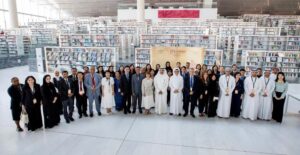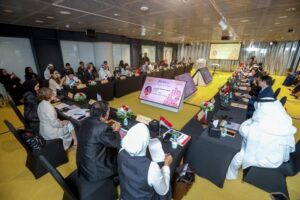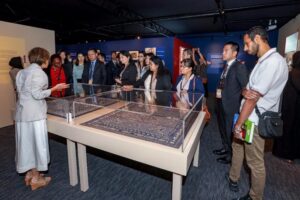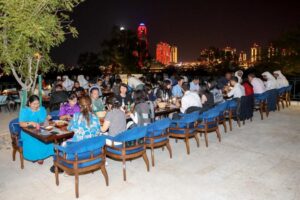A Taste of Arabia for the CDNLAO 2023 in Doha
19 February 2024
Strategies to improve collection practices and foster engagement with communities were the primary discussion topics at the 29th Conference of Directors of National Libraries in Asia and Oceania (CDNLAO), hosted by Qatar National Library (QNL). Held in Doha from 1 to 2 November 2023, the conference was attended by 57 representatives from 29 countries, along with IFLA President Vicki McDonald.

The conference was opened by QNL Executive Director Tan Huism, who introduced the three areas that the conference would address:
- What are national libraries collecting to document national heritage?
- How are the materials preserved and made accessible?
- Ways in which libraries are encouraging users to engage with their collections.
Delegates were invited to give a brief overview of their respective libraries, before the first presentations began around the theme – Collecting Content Representative of our Communities (Physical and Digital).
Huo Ruijuan, Deputy Director of the National Library of China, explained that her institution holds 70% of all ancient books in Chinese in the world. She also shared about the library’s recent initiatives including the China Memory Project, which has more than 5,000 hours of audiovisual recordings and literature, with a focus on documenting and promoting of events related to intangible cultural heritage.
Dr. Marie-Louise Ayres, Director of the National Library of Australia, discussed her library’s long-term programme of engaging and collecting items associated with diverse communities, – such as like Australians of Fijian heritage – stressing the importance of collecting with, rather than from communities.

During the second session which was on the theme “Preserving and Making the Collections Accessible”, Nidal Ibrahim Mohammad Al-Ahmad shared on the collaborative efforts of the National Library of Jordan through which the library had obtained many documents from the National Libraries in Iraq and Palestine. He also mentioned about the library’s efforts in developing a platform where Jordanian citizens can share valuable documents and photographs.
Anna Chulyan, Director of the National Library of Armenia, shared that the library had digitised all Armenian books published between 1512 and 1940, and that they were all fully accessible on the website. She also highlighted that the library has a new website that has books accessible to people with visual disabilities, thereby promoting greater community inclusion.
Presentations were also delivered by delegates from Azerbaijan, Palestine, the United Arab Emirates, Vanuatu, Sri Lanka, Kuwait, Bhutan, and Uzbekistan.
On the first day of the CDNLAO, delegates were taken on a tour of QNL’s Qatar-Indonesia Year of Culture 2023 exhibition, titled “Letters of Faith: The Arabic Script in Indonesia”. The exhibition demonstrates the strong cultural and religious links between the two countries, largely attributed to trade routes that brought an Arabic diaspora to the archipelago.

The second day of the conference opened with presentations on the theme “Activating or Engaging Communities with the Nation’s Collection”.
Abdulaziz Mohsen Salem Bin Barek, Manager of Yemen National Library, offered insights on the challenges of preserving collections in a country that has experienced considerable turmoil over the last few decades. She also explained that the Yemen National Library has a particular focus on engaging young people, recognising that they are the ones poised to guide the nation’s future.
Alicia Yeo, Director of the National Library Board (NLB) of Singapore, explained how their engagement strategies included a project to encourage people to remember stories and contribute their own. To invite the creation of new works and knowledge inspired by the collections from the National Library and National Archives of Singapore, NLB also offers digital, creative and research fellowships. She also mentioned that NLB is reaching out to the online community and deepening in-person engagements at public libraries by integrating Singaporean experiences within their collections.

It was not all work at the 29th CDNLAO. Time was also set aside for delegates to connect and immerse themselves in Qatari culture and hospitality. The gala dinner was held at Katara Cultural Village, and the history and heritage of Qatar was showcased during a tour of the National Museum of Qatar. Delegates were also hosted to lunch at one of Doha’s most popular destinations, Souq Waqif, which is known for its myriad narrow passageways and shops selling traditional Arabic dress, falcons, and handicrafts.
Several National Libraries have expressed interests in hosting the 30th CDNLAO in 2024, and we look forward to all meeting in person once again.
Contributed by Qatar National Library